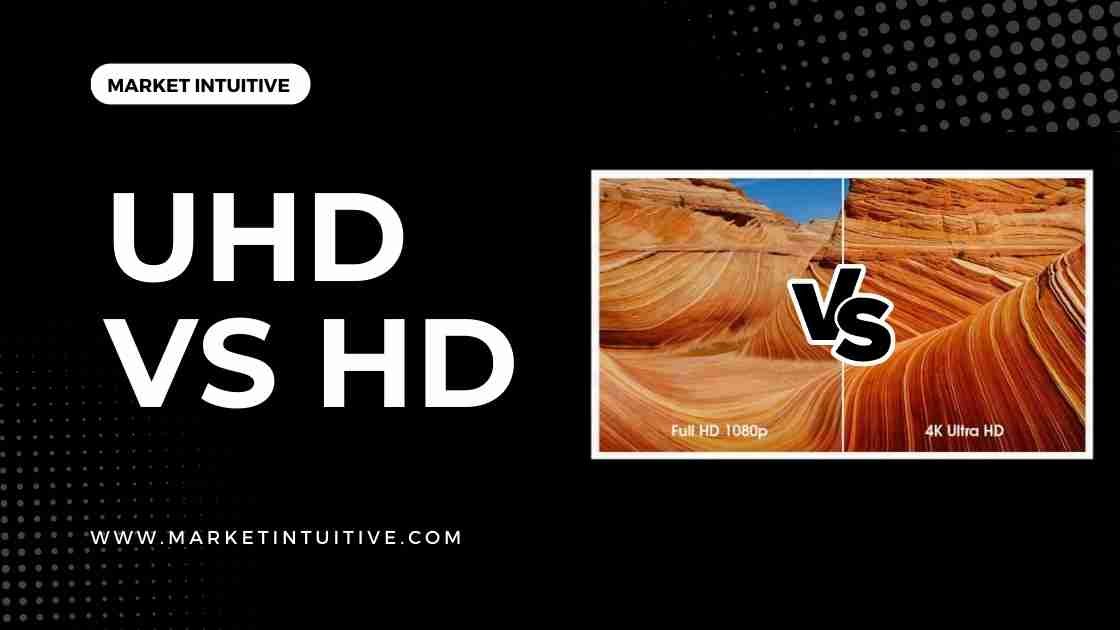UHD Vs. HD: Which Is Better?

You must have encountered the terms UHD and HD resolutions when searching for a monitor. Several brands say their computer monitor, home projector, gaming monitor, etc., feature 4K (UHD) resolution. What does UHD mean, and how is it different from HD? What is the difference between UHD VS. HD?
What about numbers such as 720p, 1080i, and 1080p? What do they stand for? You need to pay attention to these aspects as they affect the price of the screens and the quality of the images you get.
HD and UHD screen resolutions affect the quality of images you see on the screen. Screen resolution refers to the pixel count in digital marketing. So, how does UHD VS. HD vary from one another?
Let’s get into it.
What Does HD Resolution Mean?
Both 4K UHD and Full HD represent a display’s resolution. The HD resolution means the display has 1920p pixels and 1080p vertical pixels.
If you want to watch Full HD images without an FHD projector or TV, you require a Blu-ray player and connect the display using an HDMI cable. A Blu-ray disc with an HD format is also vital.
What Does UHD Mean?
UHD stands for Ultra High Definition or Ultra HD, which is 4K. 4K stands for the horizontal screen resolution with 4,000 pixels. The features of 4K UHD are different in various professional fields, resulting in varying definitions of vertical and horizontal pixels.
The 4K UHD refers to two high definitions, including 3840 x 2160p and 4096 x 2160 pixels.
Before you can buy a 4K display, you need to pay attention to various specifications. For instance, your display equipment should match the 4K resolution, such as an HDMI 2.0 terminal that can transmit 4K/60p signals.
UHD Vs. HD: Key Differences
Resolution
In UHD VS. HD, UHD (ultra-high definition) has an advantage over HD (high definition) that goes beyond the limited meaning of their abbreviations.
Let me provide an example to illustrate this. While HDTVs are usually 720p to 1080p, UHDTVs range from 2160p to 4320p or higher. (UHD televisions have over twice as many pixels as HD televisions.)
Visual Quality
In UHD VS. HD, what’s the difference between them? UHD offers a better picture quality than HD TVs, but only some things are as straightforward as they appear.
Customers generally don’t flock to higher-quality goods even if they are of higher quality because there are exceptions to this rule. Because of this, Blu-ray players continue to support HD quality, whereas UHD can only be played on 4K UHD discs.
Price
In UHD VS. HD, the price difference is significant in the case of 4K UHD TVs. From a few thousand dollars to tens of thousands, 4K UHD TVs are expensive compared to HD monitors.
What factors make the price of UHD TVs higher? The first reason is the cost of production. The manufacturing of 4K UHD TVs is more expensive than producing HD monitors. Secondly, the demand for 4K UHD TVs is higher than HD monitors.
Therefore, in UHD VS. HD, the price of 4K UHD TVs is higher. Lastly, the average life of 4K UHD TVs is shorter than HD monitors. Therefore, the price of replacing a 4K UHD TV with a new one after a few years is also higher.
Usage
In reality, the lines between UHD and HD are much fuzzier. For example, one may have a UHD TV but only watch HD broadcasts. Likewise, one might have a next-generation console capable of UHD gaming but only an HDTV incapable of displaying such high-quality pictures.
There is a clear paper distinction between UHD VS. HD when watching a Blu-ray on a UHD TV.
UHD Vs. HD: Side By Side Comparison
| UHD | HD | |
| First Standardized | 2007 | 1988 |
| Dimensions | 2160p, 4320p | 720p, 1080p |
| Aspect Ratio | 16:9 | 16:9 |
| Also Referred to As | 2160p, 4K, 8K, 16K, UHDTV, Ultra HD | 1080p, 2K, HDTV, Hi-Def |
| Predecessor | HD | SD |
| Successor | TBD | UHD |
You will see a significant variance when watching UHD and HD movies.
Most people wonder if there is any difference between the two screen resolutions before buying a screen. Is it worth spending the extra cash to purchase the UHD screen while you can be okay with the HD screen?
When you compare the two displays in image resolution, you notice a significant difference between the old and new resolutions. The UHD display has more resolution, which ensures better picture quality and more detailed images.
In UHD VS. HD, UHD display offers better color accuracy resulting in more natural, lifelike, and clear images, which help to move the audience. Additionally, the UHD resolution display provides a wide variety of viewing angles. You don’t have to worry about your viewing angle while watching a movie or playing a game with friends.
The image quality and color accuracy are not distorted with changing viewing positions. The high-quality images and color accuracy ensure you enjoy the most immersive experience, whether watching a movie or playing a game.
UHD Vs. HD: Which Is Better?
If you want to purchase a screen between UHD VS. HD? Should you pay more for the UHD screen?
The UHD screen comes with a higher resolution compared to the HD screen. The higher resolution offers you a more immersive viewing experience. The clearer color contrasts ensure that you enjoy lifelike images that lead to a more immersive viewing experience.
The UHD screen also offers smoother curves and sharper lines. The high resolution ensures that every detail on the screen is visible such that you can see every action, such as the sweat on the players’ faces and the player’s actions.
You can also enjoy a more immersive movie-watching experience as the 4K resolution ensures you enjoy more depth.
If you play your games on a 4K-enabled gaming console, you will enjoy a more lifelike gaming experience. With the 4K resolution, it is possible to see every detail on the screen.
Therefore, it is possible to see every action by your enemy even when hiding in the dark corners. Thus, the high resolution offers you a winning edge if you participate in competitive gaming.
Additionally, the enhanced pixel density ensures you can sit close to your screen and enjoy clear images. The images remain clear even when you are close to the screen without seeing the pixels. The feature is helpful if you don’t have a lot of space in your home.
If you place a 4K display pixel on an HD TV, it will only fill a quarter of the screen. That shows the great detail you get with a UHD TV compared to an HD TV. If you are working with a tight budget, you can opt for an HD screen. HD TVs come at a lower price compared to UHD TVs.
Also, the HD screens are ideal for watching SD (standard definition) content. However, you’ll notice a difference in the clarity of details and sharpness compared to a UHD TV.
Thus, between UHD VS. HD, UHD TVs are better at watching high-resolution content than HD TVs, irrespective of the screen size. If you want to purchase a 4K TV, you can check whether it comes with other helpful technologies, such as HDR, that lead to better quality images.
FAQs on UHD Vs. HD
1. What’s the highest video quality known to man?
While there’s really no limit to this question, the highest quality commercially available as of this writing is 8K UHD.
2. Is there such a thing as 16K?
Various consumer electronics studies are experimenting with 16K, but 4K UHD is currently available widely and significantly, which is far from the case.
3. Is UHD going to replace HD?
Switching from SD to HD took a long time and required much effort, so a total industry-wide shift from HD to UHD is probably a long way off. However, it almost certainly will occur one day.
4. What is the difference between 4K and UHD?
A video’s resolution is 4K, while the display technology is UHD.
5. How much higher quality is UHD compared to HD?
A resolution of at least 4K is required for UHD, whereas HD requires a maximum resolution of 2K. UHD is at least twice as high quality as HD.
Wrapping Up
If you want to purchase a TV, screen resolution is a vital factor to consider. The higher the resolution, the better the quality of images, and the more immersive the watching experience. Some of the screens you can find in the market include UHD and HD resolutions.
The UHD resolutions offer better quality and sharper images compared to HD TVs. However, UHD TVs are more expensive than HD screens.
Related Articles:
Nanocell vs UHD: Which One Is A Better TV?
IPS vs LED Monitor: Which One is Best For You?






